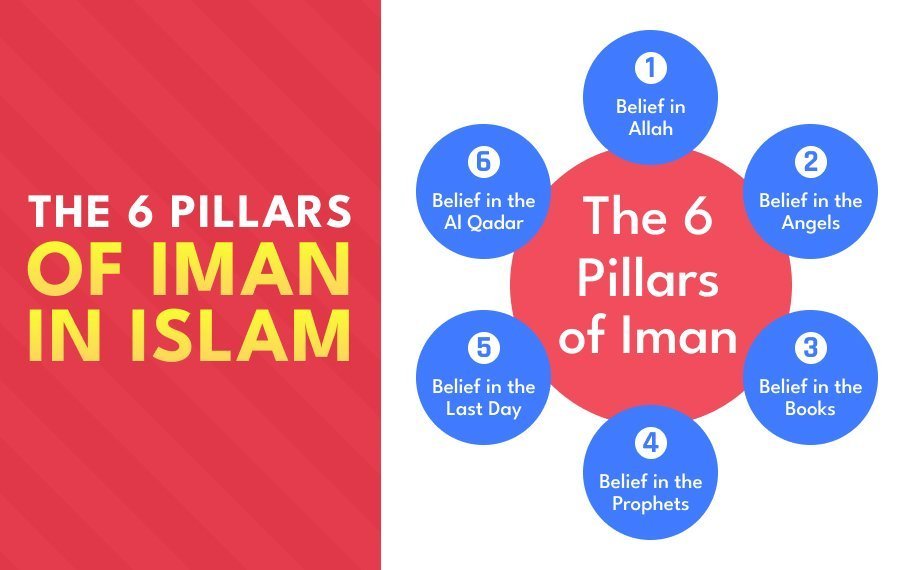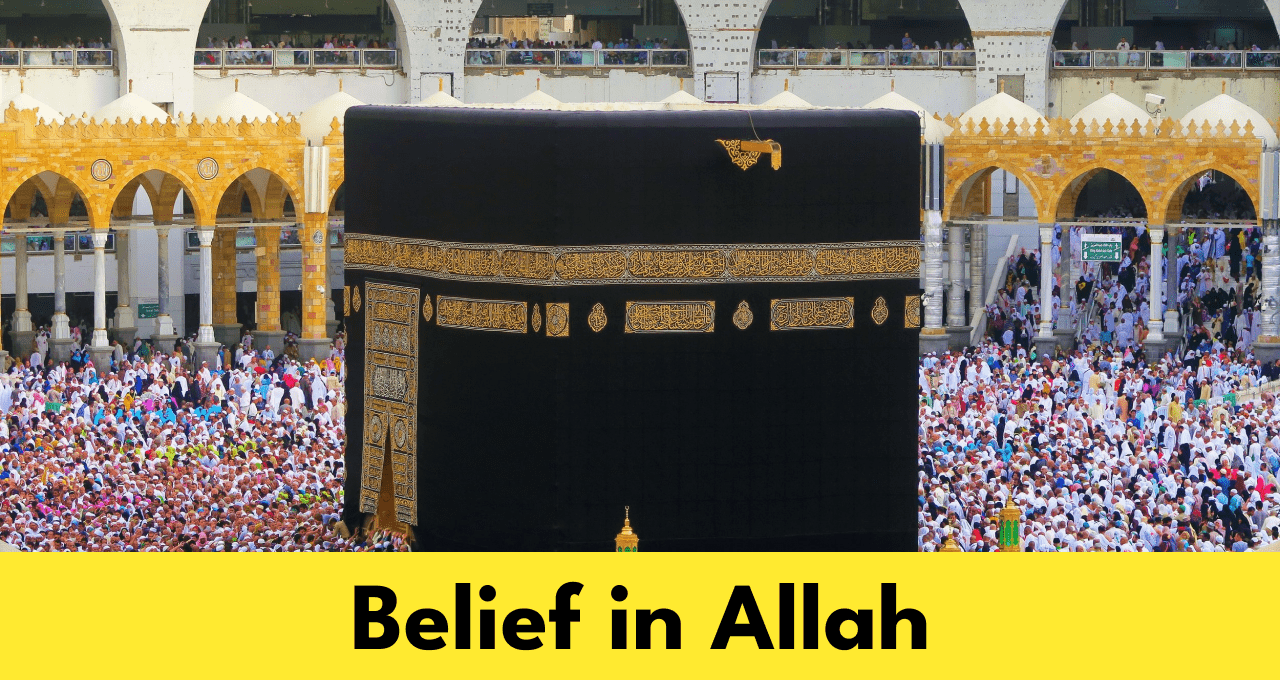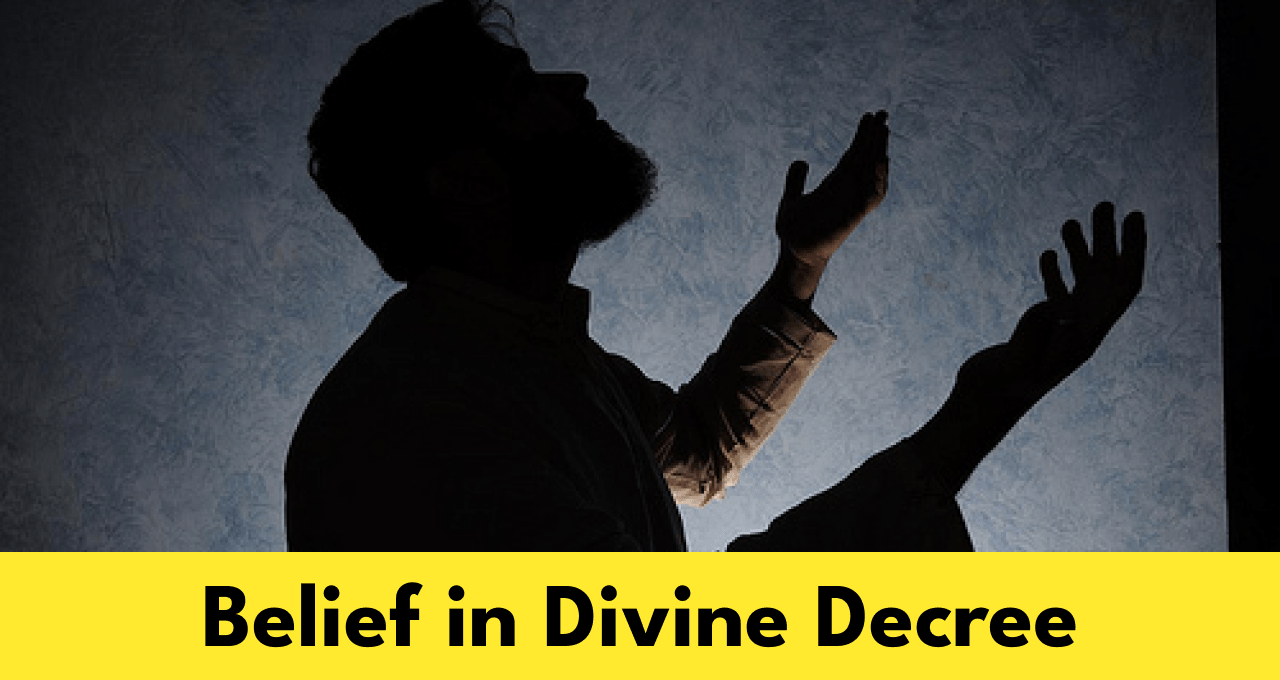
Islam, a faith founded on monotheism and divine guidance, outlines a comprehensive set of beliefs known as the 6 Pillars of Iman. These pillars constitute the core tenets that form the bedrock of a Muslim’s faith, providing a framework for understanding the relationship between individuals and their Creator. In this blog, we will explore each pillar in detail, delving into their significance and how they shape the worldview of Muslims worldwide.
The 6 pillars of Iman in order:
- Belief in Allah – the 1st pillar of Iman
- Belief in Angels – the 2nd pillar of Iman
- Belief in Books– the 3rd pillar of Iman
- Belief in Prophets – the 4rth pillar of Iman
- Belief in the Day of Judgment – the 5th pillar of Iman
- Belief in Al-Qadar – the 6th pillar of Iman
Table of Contents
Belief in Allah (Tawhid)
At the heart of Islamic theology lies the concept of Tawhid – the absolute oneness of Allah. This pillar underscores the belief in the unique, transcendent nature of God, emphasizing His sovereignty, omnipotence, and perfection. Muslims acknowledge Allah as the sole creator, sustainer, and ruler of the universe, rejecting any form of association or partnership with Him (Shirk).
It is mentioned in Surah Ikhlas,
قُلْ هُوَ ٱللَّهُ أَحَدٌ
Say, “He is Allāh, [who is] One,
ٱللَّهُ ٱلصَّمَدُ
Allāh, the Self-sufficient
لَمْ يَلِدْ وَلَمْ يُولَدْ
He neither begets nor is born,
وَلَمْ يَكُن لَّهُۥ كُفُوًا أَحَدٌۢ
Nor is there to Him any equivalent.”
(AlQuran 112:1-4)

Belief in Angels (Malaika)
The second pillar introduces the realm of angels, spiritual beings created by Allah to carry out His divine commands. Belief in angels encompasses recognition of their various functions, including recording human deeds, delivering messages to prophets, and praising Allah. This pillar reinforces the unseen aspect of the Islamic faith.
وَلِلَّهِ يَسْجُدُ مَا فِى ٱلسَّمَٰوَٰتِ وَمَا فِى ٱلْأَرْضِ مِن دَآبَّةٍ وَٱلْمَلَٰٓئِكَةُ وَهُمْ لَا يَسْتَكْبِرُونَ
“And to Allah prostrates whatever is in the heavens and on the earth of creatures. And the angels [as well], and they are not arrogant.
يَخَافُونَ رَبَّهُم مِّن فَوْقِهِمْ وَيَفْعَلُونَ مَا يُؤْمَرُونَ
They fear their Lord above them and do what they are commanded.” [Surat An-Nahl 16:49-50]

Belief in Divine Books (Kutub)
The third pillar underscores the importance of divine guidance through scriptures sent by Allah to different prophets. These include the Scrolls (Suhof), Torah, Psalms (Zaboor), Gospel (Injeel), and the final revelation, the Quran, which serves as a complete and unaltered guide for humanity. Muslims respect and acknowledge these scriptures as a source of moral and spiritual guidance.

Belief in Prophets (Anbiya)
Prophets, chosen by Allah to convey His message to humanity, constitute the fourth pillar of Iman. Muslims believe in the authenticity and righteousness of various prophets, including Adam, Noah, Abraham, Moses, Jesus, and the final prophet, Muhammad (peace be upon them). The teachings of these prophets form the foundation of Islamic ethics and morality.
وَلَقَدْ بَعَثْنَا فِى كُلِّ أُمَّةٍ رَّسُولًا أَنِ ٱعْبُدُوا۟ ٱللَّهَ وَٱجْتَنِبُوا۟ ٱلطَّٰغُوتَ ۖ فَمِنْهُم مَّنْ هَدَى ٱللَّهُ وَمِنْهُم مَّنْ حَقَّتْ عَلَيْهِ ٱلضَّلَٰلَةُ ۚ فَسِيرُوا۟ فِى ٱلْأَرْضِ فَٱنظُرُوا۟ كَيْفَ كَانَ عَٰقِبَةُ ٱلْمُكَذِّبِينَ
And We indeed sent into every nation a messenger, [saying], “Worship Allāh and avoid tāghūt.” And among them were those whom Allāh guided, and among them were those upon whom error was [deservedly] decreed. So proceed [i.e., travel] through the earth and observe how was the end of the deniers.
(AlQuran 16:36)

Belief in the Day of Judgment (Yawm al-Qiyamah)
The fifth pillar introduces the concept of the Day of Judgment, a day when every individual will be resurrected and held accountable for their deeds. Muslims believe in life after death, where actions in this world will determine eternal consequences – a reflection of divine justice and mercy.
ٱللَّهُ لَآ إِلَٰهَ إِلَّا هُوَ ۚ لَيَجْمَعَنَّكُمْ إِلَىٰ يَوْمِ ٱلْقِيَٰمَةِ لَا رَيْبَ فِيهِ ۗ وَمَنْ أَصْدَقُ مِنَ ٱللَّهِ حَدِيثًا
Allah– there is no deity except Him. He will surely assemble you for [account on] the Day of Resurrection, about which there is no doubt. And who is more truthful than Allah in a statement?
(AlQuran 4:87)

Belief in Divine Decree (Qadar)
The final pillar encompasses the belief in divine decree, recognizing that Allah has preordained all events and outcomes. While humans possess free will, Allah’s knowledge extends to past, present, and future, emphasizing the balance between personal responsibility and divine destiny.
إِنَّا كُلَّ شَىْءٍ خَلَقْنَٰهُ بِقَدَرٍ
Verily, We have created all things with Qadar (Divine Preordainments of all things before their creation, as written in the Book of Decrees Al-Lauh Al-Mahfuz).
(AlQuran 54:49)

How the 6 Pillars of Iman Shape Muslim Life?
- Clarity in Belief:
- Provides a clear understanding of fundamental beliefs in Islam.
- Shapes the perception of God (Allah), angels, divine scriptures, prophets, the Day of Judgment, and divine decree.
- Ethical and Moral Guidance:
- Acts as a moral compass, guiding ethical behavior in daily life.
- Influences interactions with others, promoting honesty, justice, and compassion.
- Spiritual Connection and Devotion:
- Strengthens spiritual connection with God and the unseen world.
- Inspires devotion through acts of worship, prayer, and supplication.
- Meaning and Purpose in Life:
- Provides a sense of purpose beyond worldly pursuits.
- Motivates good deeds in anticipation of accountability in the Hereafter.
- Community Unity and Responsibility:
- Unites Muslims worldwide under shared beliefs.
- Fosters a sense of belonging and responsibility toward the Muslim community and society at large.
- Personal Development and Resilience:
- Encourages self-reflection and acceptance of life’s challenges as part of God’s plan.
- Builds resilience by acknowledging divine decree and trusting in God’s wisdom.
- Balanced Outlook:
- Encourages a balance between striving for success and acknowledging God’s ultimate control over outcomes.
- Balances effort with reliance on God (Tawakkul).
- Continuous Learning and Growth:
- Stimulates ongoing learning and deeper understanding of faith.
- Encourages seeking knowledge to strengthen beliefs and practice.
These pillars serve as a foundational guide for Muslims, shaping their beliefs, values, behaviors, and interactions with others, leading to a holistic and purposeful way of life centered around faith in Islam.
Conclusion
The 6 Pillars of Iman collectively provide Muslims with a comprehensive framework for their faith, shaping their worldview, moral compass, and spiritual journey. Embracing these pillars fosters a deep connection with Allah, a sense of accountability, and a commitment to virtuous living. By understanding and embodying these foundational beliefs, Muslims strive to navigate life with purpose, humility, and an unwavering commitment to their Creator.
FAQs
1. What Are the 6 Pillars of Iman?
Answer: The 6 Pillars of Iman are fundamental beliefs in Islam: Belief in Allah, Angels, Divine Books, Prophets, the Day of Judgment, and Divine Decree.
2. Why Are the 6 Pillars of Iman Important?
Answer: They serve as the core principles of the Islamic faith, shaping a Muslim’s beliefs, actions, and worldview, providing guidance on moral conduct and spiritual development.
3. How Do the 6 Pillars Define a Muslim’s Relationship with Allah?
Answer: They reinforce the belief in the oneness of Allah, recognizing His attributes, sovereignty, and authority, fostering a deep connection and submission to Him.
4. Are the 6 Pillars of Iman Mandatory for Muslims?
Answer: Yes, belief in these pillars is mandatory for every practicing Muslim. They form the foundation of Islamic belief and are essential for one’s faith.
5. How Do the 6 Pillars Shape Islamic Ethics and Morality?
Answer: They provide a moral framework by guiding believers on ethical behavior, accountability, and righteousness, based on the teachings of prophets and divine scriptures.
6. What Role Do the Angels Play in Islam According to the 6 Pillars?
Answer: Belief in angels emphasizes their roles as messengers, recording deeds, and praising Allah. It underscores the unseen aspect of the Islamic faith.
7. Why Is Belief in the Day of Judgment Important in Islam?
Answer: Belief in the Day of Judgment encourages accountability and ethical conduct, emphasizing that all actions will be judged and rewarded or punished accordingly in the afterlife.
8. How Do Muslims View the Divine Books According to the 6 Pillars?
Answer: Muslims believe in the authenticity and importance of divine scriptures sent by Allah to guide humanity, including the Quran as the final and complete revelation.
9. Do Muslims Believe in Predestination According to the Pillar of Divine Decree?
Answer: Yes, Muslims believe in divine decree (Qadar), acknowledging Allah’s knowledge and control over all events while affirming human free will and responsibility.
10. How Do the 6 Pillars Impact a Muslim’s Daily Life?
Answer: They serve as a guide for daily practices, ethical decision-making, worship, and interactions, shaping a Muslim’s character and conduct in various aspects of life.
Read Also
Splitting of the Moon – A Divine Miracle
Do Muslims Celebrate Christmas?
Signs of the Day of Judgment (Qiyamah)
How to Be a Successful Husband – 20 Tips
How To Be A Good Wife – 21 Effective Tips
The 5 Pillars of Islam – All You Need To Know

